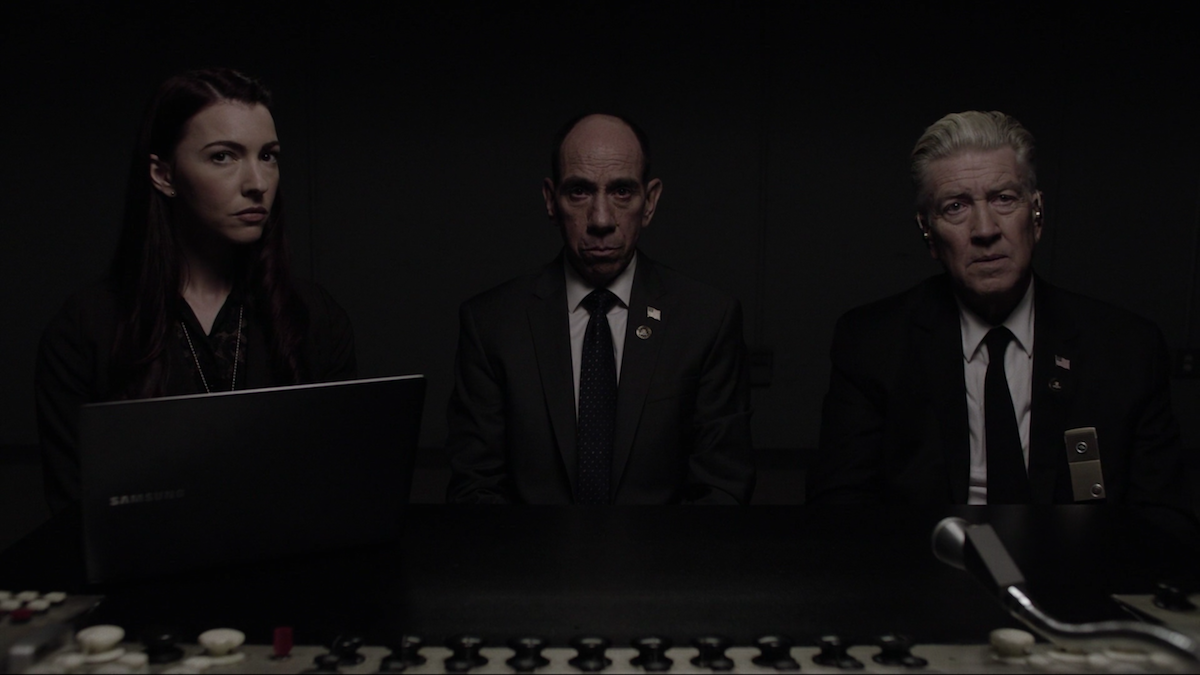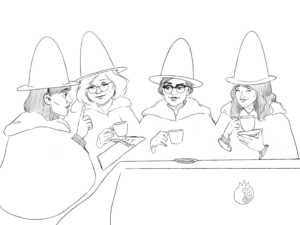Disclaimer: Twin Peeks is a recap/review series about the new season of Twin Peaks — which means there are gonna be spoilers here for everything old and new. If you’re not caught up yet, please do yourself a favor and at least consider it before reading this. If not, you’ll be pretty lost, and you need to get your bearings before diving in. Trust me on this one.
One of the most memorable things about the original Twin Peaks was its earnest quirkiness. In the decades since it premiered, the unusual eccentricities of everyone’s favorite Northwestern town have been a big reason for the show’s cult status. When The Return premiered two weeks ago, it was clear that this was going to be a decidedly more sobering show than its predecessor. However, in last week’s episodes, echoes of the old Twin Peaks blended into the nightmarish tone of the two-episode premiere, mostly for better but sometimes for worse.

When we last left Special Agent Dale Cooper, things were…complicated, to say the least. He was still trapped in the Black Lodge, with his doppelganger Mr. C running amok on the outside. Episode 3 opens with Cooper whooshing through space after falling through the floor of the Black Lodge at the end of the last episode. He eventually winds up in a house by the sea, bathed in pink light. There, he’s greeted by an eyeless woman who speaks in white noise and guides him out of the home and onto the rooftop. When the woman is seemingly electrocuted after flipping a switch on the roof, she falls into space. Cooper pauses on the roof when suddenly a familiar face (the first of many in 3 and 4) passes by: Major Garland Briggs (Don S. Davis), saying two words, “Blue Rose.”
Fans of Fire Walk With Me will be familiar with these outwardly meaningless words. In the movie, hard of hearing Regional Bureau Chief Gordon Cole (a role iconically filled by David Lynch himself) uses symbols to communicate important information about a case to two other agents. One of those symbols is a blue rose, speculatively meaning a case is tied to the supernatural.
After this encounter with Major Briggs, Cooper returns to the house, where he’s greeted by a woman who bears a striking resemblance to Ronette Pulaski, the girl who was with Laura Palmer on the night of her death. She speaks like a resident of the Lodge and urges Cooper to leave. He does, passing through an outlet-shaped opening in the wall with the number 3 labeled above it, only leaving behind his shoes. Where he ends up is the start of Lynch’s return to the original show’s absurdist tone.

“When you get there, you will already be there,” the Ronette look-alike says before he leaves, and she’s right. This warning, however, doesn’t lead where you’d think. Instead of switching with Mr. C when he makes his way out of the Lodge, Cooper finds the unassuming, “manufactured” Dougie Jones (also played by Kyle Maclachlan). At the same time, Dougie and Mr. C both vomit garmonbozia (Fire Walk With Me proves important yet again), a substance that looks like creamed corn but symbolizes suffering and pain. Spirits like BOB from the Black Lodge feast off of sorrow and pain, but it’s hard to say what the expulsion of it means for Mr. C and Dougie. In the end, Dougie is the one that ends up in the Black Lodge leaving Cooper and Mr. C in the real world. Now, according to The One Armed Man, one of them must die.

What follows in the wake of this supernatural switch is reminiscent of the old Peaks, to a point. When we see Cooper struggling to relearn life on this plane of existence — it makes sense that he’d be in a catatonic state after 25 years in another dimension — it leads to many of the third and fourth installments’ most absurd and best moments.
He has forgotten about the basics of the world, fumbling with rotating doors and only being able to parrot pieces of what others tell him. When he returns from the casino and begins to settle into life as Dougie the next morning he: cannot dress himself, doesn’t know what to do with a stack of pancakes, and spits out (!!!) his coffee at breakfast. It’s at once funny and painful to watch a character so beloved be so lost. However, it also feels like Cooper may be closer to finding home and himself again. When he spits out the coffee, it feels like more of an awakening than an aversion to the drink, but we’ll have to wait and see where this leads. Meanwhile, in Twin Peaks and at the FBI’s Philadelphia headquarters, plenty of familiar faces return. Their earnest quirks are back in full force, for better and worse.

Hawk sits with Andy and Lucy at a table strewn with files and evidence from the case that started it all, trying to figure out what is missing. More of the old Peaks begins to show itself here, but it’s not always for the best. I love these characters, but the dialogue in this sequence is hit or miss. Then, Lucy’s profound misunderstanding of cellular technology and a visit from her and Andy’s son Wally Brando (Michael Cera, and yes, you read that correctly) feel more forced than necessary. These moments don’t land with the earnestness you’d expect from the good people of Twin Peaks.

The latter scene is quite literally useless, filling in a good five minutes of screentime with Cera pulling out his full Brando-Godfather impression for no particular reason. I laughed, but only at the gall to include it in any way whatsoever (damn you, David).
The hits, however, made the misses worth enduring. Robert Forster as Sheriff Frank Truman (the other one’s constantly “gone fishing” and has left his brother in charge), the return of teenage bad-boy Bobby Briggs (Dana Ashbrook) but in full deputy uniform, and Hawk’s “Donut Disturb” sign are chief among them. This isn’t your mom’s Twin Peaks, but at the end of the day, it still feels like home.
In Philadelphia, Gordon Cole and Albert Rosenfeld (the late, great Miguel Ferrer) are still working together, and it’s nice to see that aside from aging gracefully neither has really changed. Their banter is still great, with Gordon’s earnest decency and Albert’s blunt (but really only surface level) cynicism playing off of each other well. Speaking of familiar faces, Denise Bryson (David Duchovny), who’s now the FBI’s Chief of Staff also makes an appearance. It’s good to see that she’s in a higher position of power, held in esteem by her coworkers, and still respected by the show. “When you became Denise, I told all of your colleagues, those clown comics, to fix their hearts or die,” Cole says. It’s a truly lovely moment for a character that was once almost revelatory in her first appearance on the show but could’ve seemed dated or out of place in 2017.

Everything at the FBI’s office isn’t all hits, however. Namely, there is the new girl, Agent Tamara Preston (Chrysta Bell). Agent Preston briefs Gordon and Albert on the deaths of Sam and Tracey in New York and is deemed important enough to come along with them when they find out (Evil) Cooper is in South Dakota. Bell’s performance can be a bit stilted and awkward at times, and the treatment she receives in episode 4 is especially off-putting. As Gordon and Albert prepare to discuss what’s wrong with Cooper, she’s sent away. “I’m feeling better now,” Albert says, watching her strut into the diner ahead of them. It’s played for laughs, but made me pretty uncomfortable, especially coming from a beloved character.
Moments like this can be found peppered across Lynch’s work, albeit in more serious and clearly violent ways. It’s in the treatment of many of his female characters throughout his films. Isabella Rossellini’s Dorothy Vallens in Blue Velvet, Laura Dern’s Loola in Wild at Heart, and of course Sheryl Lee’s Laura Palmer all suffer horrible abuse. While Lynch’s female characters are also strong, complicated, mysterious women, it’s no secret that there is a troubling thread uniting many of them — violence. I’ve struggled to come to terms with the misogyny in his films as a woman, feminist, critic, and fan, but I don’t think it’s something that will ever sit well with me no matter how much I love his work. Albert’s comment was a cutting reminder of this.

Last week’s episodes were a wild ride, and an interesting blend of the nightmarish atmosphere Lynch imbued in the first two episodes and the old endearing quirkiness of the original series. There were revelations, familiar faces, more cool bands at The Bang Bang Bar (The Cactus Blossoms and Au Revoir Simone), and some serious jazz going on. Even if there were places that felt off at times, it feels like things aren’t going to be slowing down anytime soon especially with 14 episodes left to get through. This Sunday’s episode should be no exception. I’m excited to see where it’ll lead us, but until then I’ll be waiting with bated breath (and scouring the internet for Dougie’s coffee mug).




